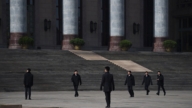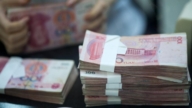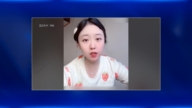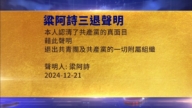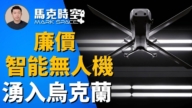【新唐人2013年03月16日訊】中國大陸當局近期決定撤銷原鐵道部,並成立「中國鐵路總公司」負責企業經營職能,14號已正式掛牌。不過,原鐵道部總負債2萬6千6百億元,將由新組建的鐵路總公司繼承。未來如何處置鐵道部的債務,以及公司上市投、融資的安排﹖中國社會各界都在關注。
3月14號上午,全國人大表決通過了國務院機構改革方案,鐵道部正式被拆分。據了解,原鐵道部職能將劃分為三。其中的行政職責,劃入交通運輸部,並組建國家鐵路局,承擔鐵道調度指揮;和「中國鐵路總公司」,負責經營建設。
新組建的「中國鐵路總公司」將原鐵道部的相關資產、負債和人員劃入。而原鐵道部對所屬的18個鐵路局、和3個專業運輸公司,以及其他企業的權益,成為「中國鐵路總公司」的國有資本。
「中國鐵路總公司」經國務院批准設立,為國家授權投資和國家控股的「國有獨資企業」,盛光祖為公司法定代表人。而財政部代表國務院履行出資人職責,交通運輸部、國家鐵路局對公司進行行業監管。公司註冊資金為1萬360億元人民幣。不進行資產評估和審計驗資。
根據國務院辦公廳發佈的《國務院關於組建中國鐵路總公司有關問題的批覆》公文內容,「中國鐵路總公司」的國有資產收益,除按照規定執行外,歷史債務問題沒有解決前,國家對公司暫不徵收國有資產收益。而且在保證有關企業合法權益和自身發展需要的前提下,公司可集中部分國有資產收益,由公司用於再投入和結構調整。
北京市民:「這就是一種變相的把國有的變成私有的吧!這等於又不花錢、又不摀的,又一萬多個億又沒了嘛!這就是變相的搶劫!」
另外,根據鐵道部最新的債券募集書披露,截至2012年9月末,鐵道部總資產4.3萬億元,總負債2.66萬億元,主要包括1.4萬億的銀行貸款,以及近8000億的債券。
據了解,鐵道部大部分的債務,都是2008年以來所謂「鐵路建設大躍進」所積欠。
香港媒體報導,「中國人民銀行」相關負責人日前表態:鐵道部現有全部債務將由中國鐵路總公司繼承,同時中共當局將繼續支持這些債務,不會因為鐵道部的撤銷而影響。
報導說,分析人士認為,面對如此龐大的債務重壓,在政企分開的道路上,當局不得不延續這種「藕斷絲連」才能實現債務的平穩過渡。但潛在的隱憂依舊「難解」!
分析說,「中國鐵路總公司」未來的路並不好走。可能因為自身償債實力偏弱,投資者將要求更高的風險溢價。
不僅如此,一位基金公司人士表示,如果債務交給了鐵路總公司,作為一家企業的債務,要想視為中央政府債權或公共部門債權,必須經過特批。僅作為央企的話,很可能面對100%的風險權重,將極大的影響商業銀行的投資積極性。
另一個致命軟肋是授信集中度。報導說,近年來,商業銀行對鐵道債的需求明顯變弱,不僅在於鐵道部激進擴張帶來的基本面惡化,也與所謂「監管指標」的約束有關。除非繼續出臺更強的政府信用背書政策,否則「鐵道債」的實際信用級別,可能被長期削弱。
全球自由信息運動創辦人張新宇:「因為以前鐵道部是獨立的一個部門,非常龐大…它的官僚權力非常大,完全是國營的,不是自負盈虧的。這樣以來的話,它那官員或者管理人根本就是…光考慮管著人,而不考慮裡子。鐵道部早就應該這樣做的事情(撤銷),做了這麼多年,才把它做成現在這樣,我覺得就說明中國政治改革無望!」
另一方面,隨著鐵道部正式撤銷,中國18個鐵路局的命運也備受關注。專家建議重組18個地方鐵路局。
採訪/陳漢 編輯/周平 後製/孫寧
China Railway General Corporation Will Inherit MOR Debt
The Chinese authority decided recently to withdraw
the Ministry of Railways(MOR) and to found “China Railway General Corporation”.
This will take over the business functions of MOR.
The new company started its business on March 14.
The company inherits the debt of MOR which is
2,660 billion RMB.
How can the new company deal with this debt?
How does the company operate funding and investment?
These are the questions that are causing the
outside world the most concern.
On the morning of March 14, the Chinese Communist Party
National People’s Congress passed
the State Council’s reform plan and MOR was officially split.
It is understood that the MOR was divided into three parts:
administrative duty is assigned to the Ministry of Transport (MOT).
The railway net’s dispatching work will be taken on
by a newly founded National Railway Bureau.
The operation and construction will be handled
by the China Railway General Corporation.
The newly formed China Railway General Corporation
receives the related assets, debts and employees of MOR.
The former 18 railway bureaus, the former 3 professional
transportation companies, and other business units compose the new company’s state-owned assets.
The China Railway General Corporation was approved
by the State Council, and is a state-authorized investment and state-controlled “state-owned enterprise”.
Sheng Guangzu is the legal representative of the company,
the Ministry of Finance takes responsibility as investor on behalf of the State Council.
The MOT and National Railway Bureau
will supervise the company’s operation.
The company’s registered capital is 1,360 billion RMB,
and won’t have assets evaluation nor capital auditing.
According to the announcement of the State Council
“The State Council’s Approval on Setting Up the China Railway General Corporation”,
the state will not any profit from the China Railway General
Corporation except that agreed, before it solves the debt issue.
According to the legal conditions of guarantee of
corporate benefit, and for it’s self development,
the company can retain part of it’s profit for reinvestment,
and for structure adjustment even though the income may be generated by state-owned assets.
A Beijing resident: “This is a disguise to transfer
the state-owned assets to private capital !
It’s giving billions out without any payback and
without any cover! It is robbery in disguise !”
In addition, according to the latest bonds raising plan of MOR,
the total assets of the MOR is 4,300 billion RMB,
total debt is 2,660 billion RMB which includes 1,400 billion
bank loan and nearly 800 billion in RMB bonds.
It’s understood that most of the debt was used for
the so-called “Railway Construction Great Leap Forward” which started in 2008.
Hong Kong Media reported that the responsible person of
the People’s Bank of China said that all the debt of MOR
will be inherited by China Railway General Corporation.
At the same time, the CCP regime will support the debt.
The debt won’t be impacted by the revocation of MOR.
The report said that analysts thought facing such huge debt,
the authority has to take this kind of “don’t completely cut off”
solution by way of separating the politic and enterprise
which can help to realize the stable transfer of the debt.
There are nevertheless potential risks that
can’t be avoided.
It said that the future road of “China Railway General
Corporation” won’t be an easy one.
This is because it is too weak to pay for the debt by itself,
and investors will require a higher risk premium.
Moreover, an employee of a fund company said that
the debt of the China Railway General Corporation is a debt of enterprise,
which has to have special approval if it wants to be treated
as central government debt or as a public sector debt.
As a state-owned enterprise, it will probably face a 100%
risk weighting that will severely impact the investment enthusiasm of the commercial banks.
Another flaw is the fatal weakness of credit concentration.
It is reported that in recent years, the commercial banks’
demand on railway bonds has decreased significantly.
It’s not only MOR’s radical expansion in construction
that has brought about the deterioration of its base.
It is also because of the restriction of the
“supervision indicator”.
Unless the government can issue a stronger supporting policy,
the real credit level of “Railway Debt” may be weakened in the long term.
Zhang Xinyu, the founder of Global Information Freedom:
“As before, MOR is an independent department, enormous, and with considerable bureaucratic power.
It’s purely state-owned which means it isn’t self-financing.
So its officials or managers are simply thinking about
how to manage others but not thinking about profits, MOR should be revoked.
The CCP spends so many years and
creates the current situation!
I think this shows that China’s prospects for
political reform are without hope!”
On the other hand, with MOR’s official revocation,
the fates of the 18 Railway Bureaus are concerned.
Experts have recommended reorganizing those other bureaus.


